
Conditionals Types of Conditional Sentences learn English,english,grammar,conditional,verbs
Conditional Sentences Type 3 adalah alat yang berguna dalam bahasa Inggris untuk membicarakan situasi yang tidak mungkin atau sangat tidak mungkin terjadi di masa lampau. Dengan menggunakan rumus yang tepat, kita dapat mengungkapkan apa yang akan terjadi jika situasi itu berjalan berbeda. Ingatlah untuk memahami perbedaan antara tipe 3 dan tipe.

Conditionals 04 Types of Conditional Sentences in Grammar
In third conditional sentences, the structure is usually: If + past perfect >> would have + past participle. Mixed conditionals. We can use mixed conditionals when we imagine a past change with a result in the present or a present change with a result in the past. 1. Past/Present . Here's a sentence imagining how a change in a past situation.
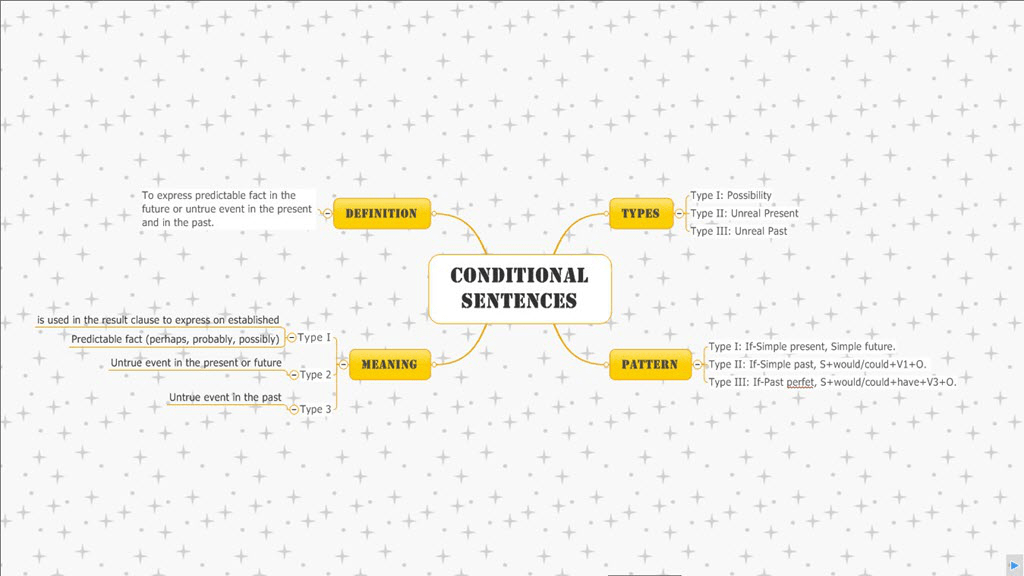
Penjelasan Lengkap Conditional Sentences Type 1, 2, 3 Dindin.id
Conditional sentence type 3 atau third conditional sentence adalah kalimat pengandaian yang digunakan ketika ingin mengungkapkan sebuah kondisi yang tidak mungkin bisa terwujud sama sekali. Hal ini karena kondisi yang diungkapkan sangat mustahil, atau hanya sebuah imajinasi.

CONDITIONAL SENTENCES TYPE III English ESL worksheets pdf & doc
Dengan kata lain, kenyataan yang terjadi adalah kebalikannya dari apa yang diungkapkan oleh kalimat yang menggunakan conditional sentence ini. Yuk, pahami conditional sentence lebih dalam lagi di sini! Conditional Sentence Type 3. source: giphy.com. Pengertian dan Rumus. Dalam kalimat Bahasa Inggris, conditional sentence ini diawali dengan kata.
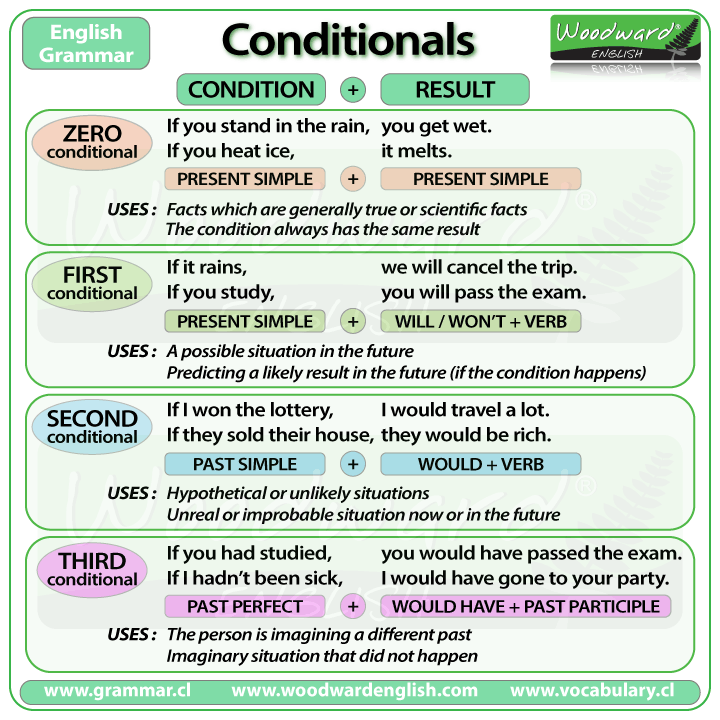
Conditional sentences
Conditional Sentence Type 3. Conditional sentence type 3 merupakan kalimat pengandaian yang tidak mungkin terjadi. Bisa dikatakan bahwa pengandaian ini hanyalah mimpi atau imajinasi. Dalam tipe kalimat pengandaian yang ketiga ini, bentuk kalimat menggunakan past perfect yang dilengkapi dengan modal auxiliary seperti would, could, dan should.. Rumus yang digunakan di kalimat conditional.

Type 3 conditional sentences English With Ashish
Third conditional sentence (Conditional Sentence Type 3) C onditional sentence type 3 adalah bentuk kalimat untuk mengungkapkan bahwa seharusnya ada kondisi yang bisa terjadi di masa lalu, atau bisa juga untuk menyatakan situasi yang seharusnya bisa saja tidak terjadi di masa lalu, tapi malah kejadian.
Click on IF... (Conditional sentences)
There are four different types of conditional sentences in English. Each expresses a different degree of probability that a situation will occur or would have occurred under certain circumstances. 1 Zero conditional sentences. 2 First conditional sentences. 3 Second conditional sentences. 4 Third conditional sentences

What Are the Types of Conditional Sentences & How to Use Them? Capitalize My Title
The type 3 conditional refers to an impossible condition in the past and its probable result in the past. These sentences are truly hypothetical and unreal, because it is now too late for the condition or its result to exist. There is always some implication of regret with type 3 conditional sentences. The reality is the opposite of, or.
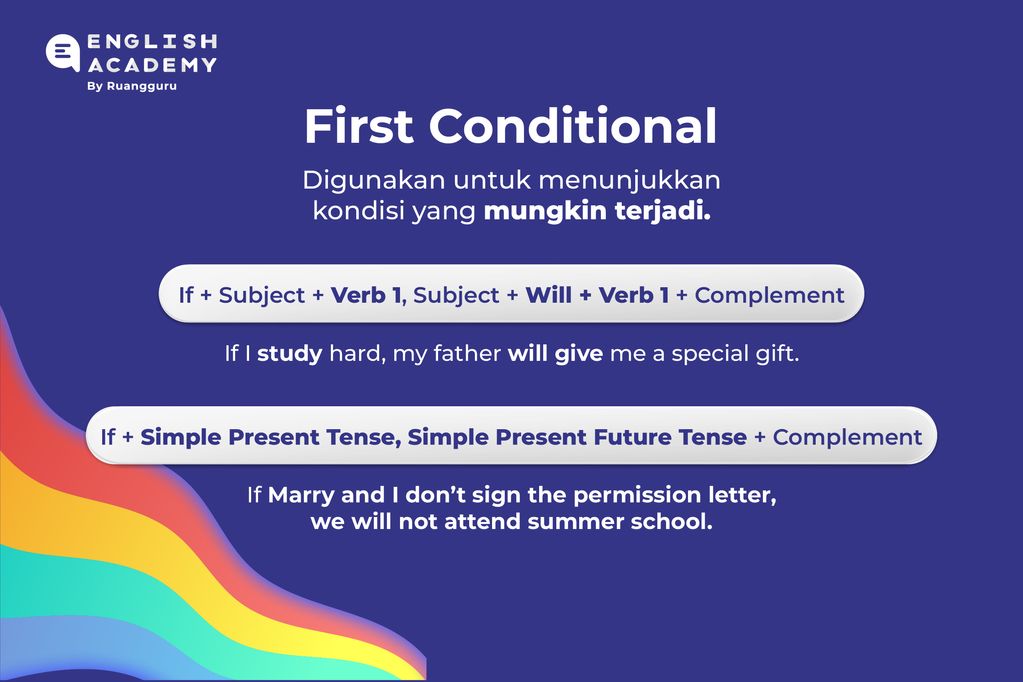
5 Tipe Conditional Sentences (If Clause), Rumus, dan Contoh Kalimatnya Belajar Bahasa Inggris
Conditional sentence type 3 atau conditionals type 3 adalah kalimat pengandaian bahasa Inggris tipe 3. Kalimat ini fungsinya adalah untuk menjelaskan kondisi tidak mungkin di masa lalu, dan tidak mungkin terjadi di masa sekarang karena kejadian tersebut sudah terlambat. Dengan kata lain, kenyataan yang terjadi adalah kebalikannya dari apa yang diungkapkan oleh kalimat ini.
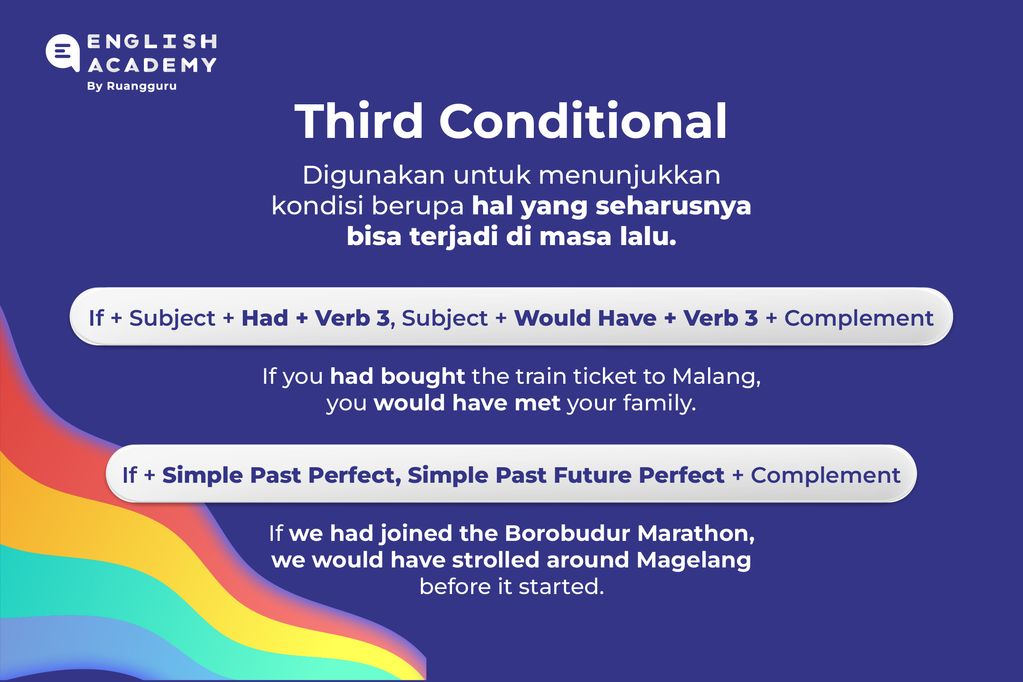
5 Tipe Conditional Sentences (If Clause), Rumus, dan Contoh Kalimatnya Belajar Bahasa Inggris
Conditional sentences - type III. 1. Use. It is impossible to fulfil a condition which is given in the if-clause. 2. Form. if clause main clause; Past Perfect: would + have + past participle: could + have + past participle: might + have + past participle: 3. Examples. if clause main clause; If I had studied,
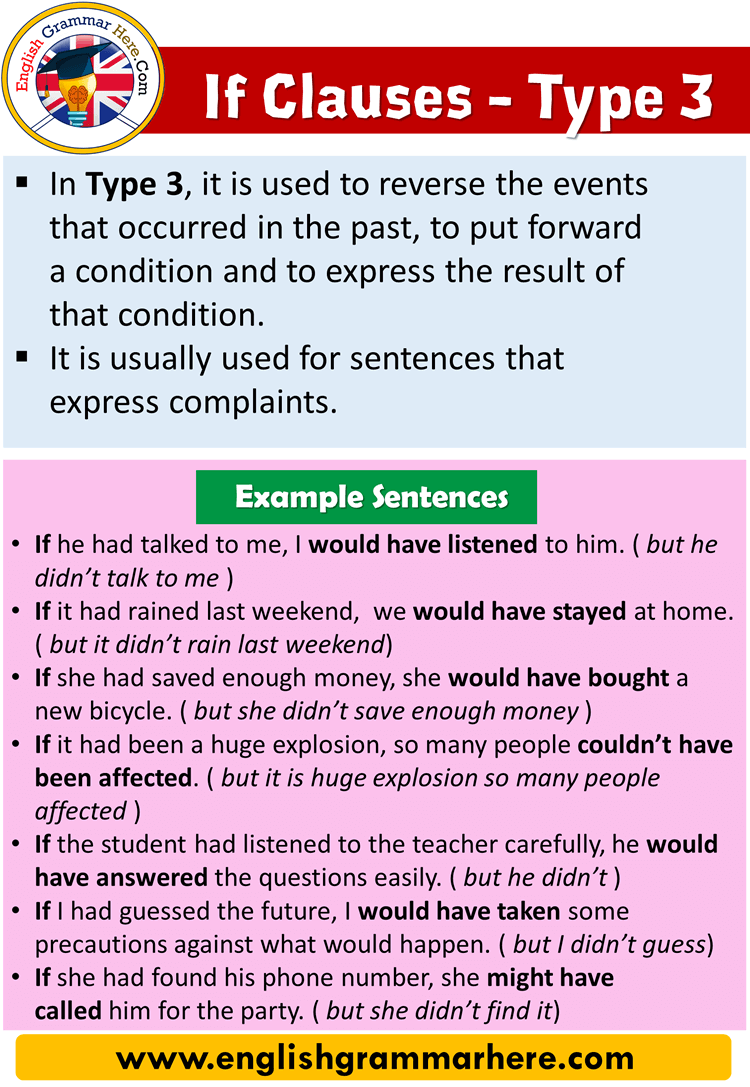
If Clause Type 3, Conditional Type 3 English Grammar Here
Form In a Type 3 conditional sentence, the tense in the 'if' clause is the past perfect, and the tense in the main clause is the perfect conditional or the perfect continuous conditional.

Conditional Sentence Type 3
Berikut ini contoh kalimat conditional sentences type 1, 2, dan 3: Tipe & Rumus. Contoh Kalimat. Type 1 (Hypothetical Conditionals) If + S + were / verb 2 + O, S + would + base verb + O. If you were on an escape from police, you would get caught right away. If Adam Levine proposed to me, I would go crazy. Kedua contoh di atas menggambarkan.
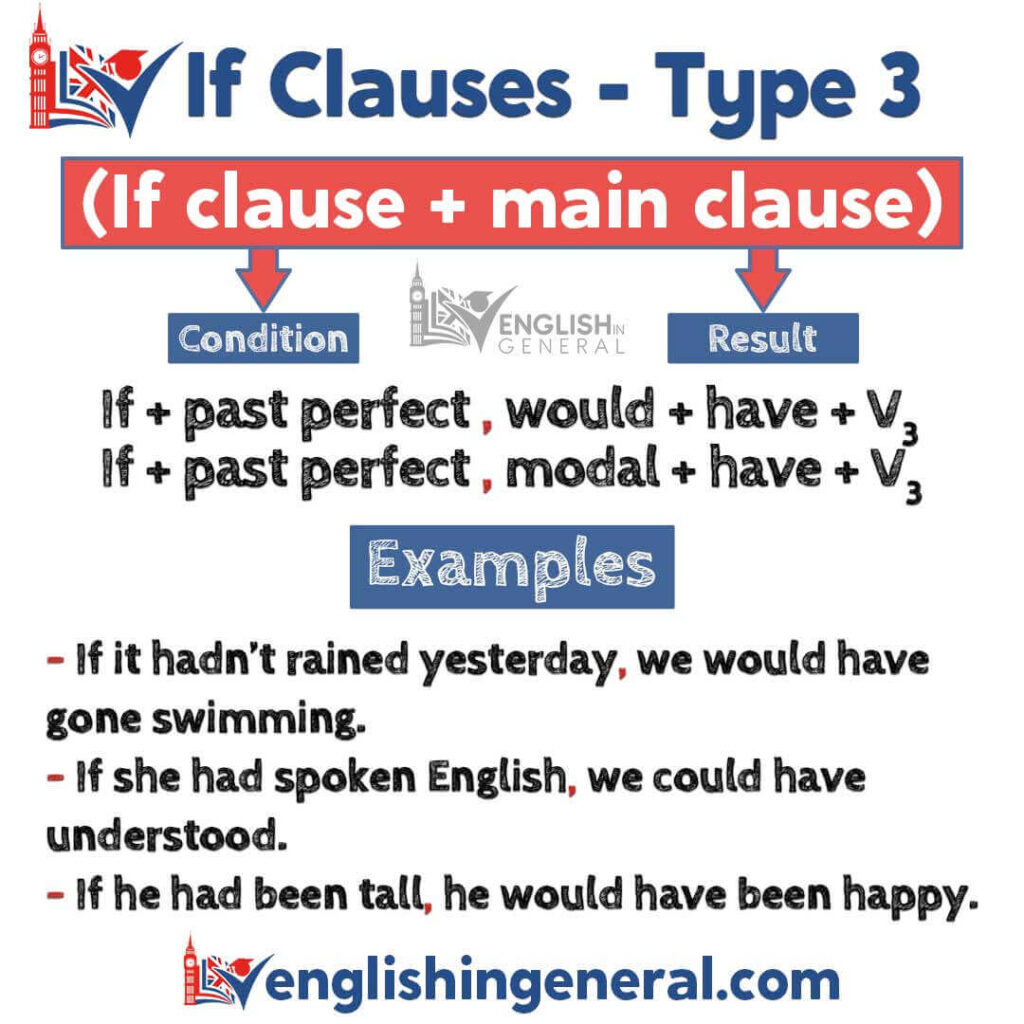
Third conditional sentence (ifsentence type 3) English in General
The four different types are. Zero conditional: If you jump in a pool, you get wet. First conditional: If you run a mile in the scorching heat, you will sweat. Second conditional: If I were you, I would apply for that job. Third conditional: If I had known you were coming, I would have made more food. Table of Contents.
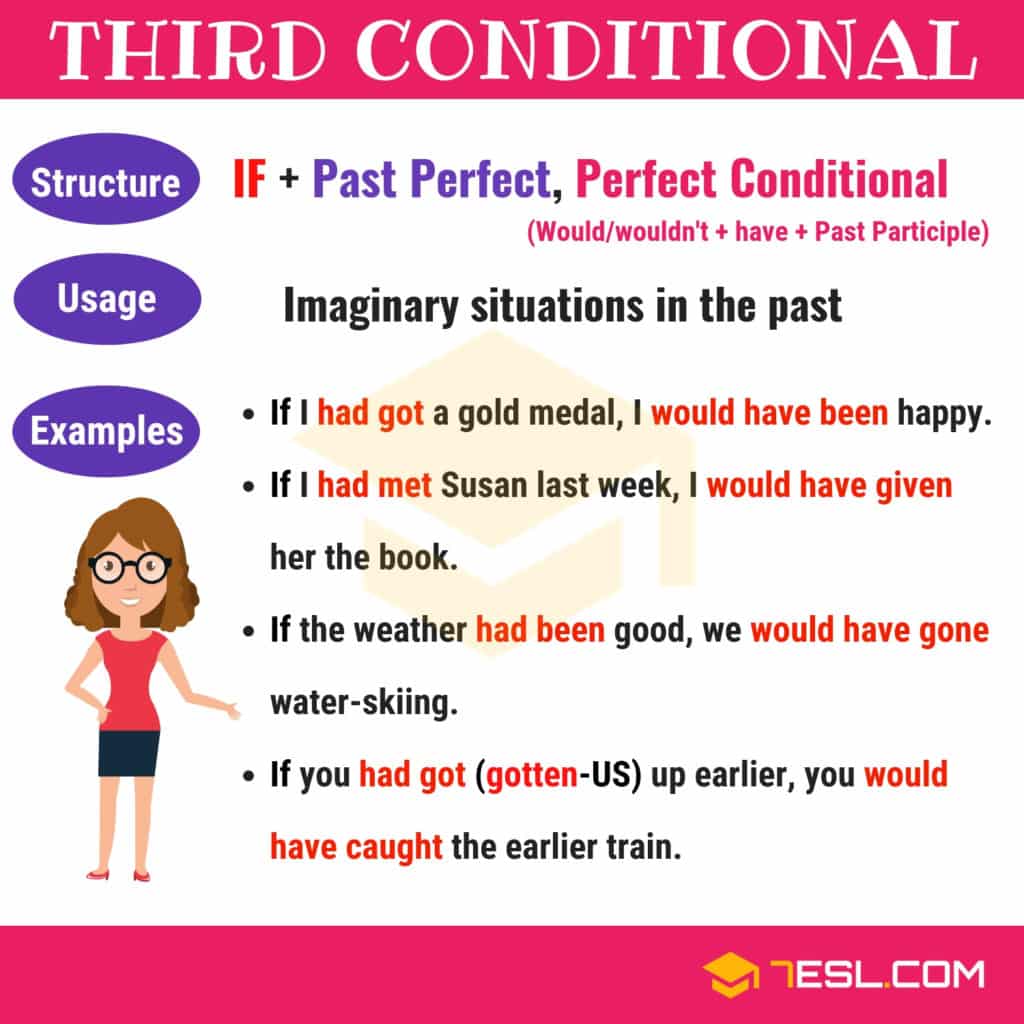
The Third Conditional Conditional Sentences Type 3 Structure & Examples • 7ESL
Tipe-Tipe Conditonal Sentence. Conditional sentence dibagi menjadi beberapa tipe. Di antaranya adalah: Conditional sentence type 0. Tipe ini biasanya disebut sebagai zero conditional sentences. Tipe kalimat ini digunakan ketika hasil atau konsekuensi dari kondisi terwujud alias memaparkan sebuah kebeneran (general truth) dan fakta ilmiah.

Third Conditional Conditional Sentences Type III English Grammar 7 E S L
Conditional Sentence Type 0. CS tipe 0 ini masih sangat sederhana dan mudah untuk dipahami. Conditional sentence tipe ini digunakan untuk mengatakan suatu fakta dengan menggunaan rumus "jika…maka". Misal, dalam bahasa Indonesia, jika kita mengatakan "Jika hujan, maka rumput menjadi basah.". Dapat juga diungkapkan dalam bahasa Inggris.

Conditionals 04 Types Of Conditional Sentences In Grammar 7 E S L English grammar tenses
We make the third conditional by using the past perfect after 'if' and then 'would have' and the past participle in the second part of the sentence: It talks about the past. It's used to describe a situation that didn't happen, and to imagine the result of this situation. If she had studied, she would have passed the exam (but, really we know.